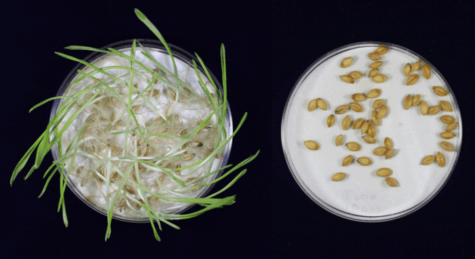OKAYAMA, Japan — Can science help make a better beer? Researchers in Japan believe they’ve found a way to make one of the beverage’s key ingredients more resistant to the impact of poor weather and climate change.
Using genetic manipulation, a team from Okayama University, have created the “perfect” barley which won’t sprout before the harvest season. Scientists note that too much rain can result in the untimely sprouting of this valuable crop.
Sprouted barley fetches a significantly lower price for farmers and corporations in the beer industry, putting them at the mercy of Mother Nature far too often. Study authors say farmers can avoid this problem if their barley had a longer dormancy period. To help make that possible, the team turned to gene editing technology to change the makeup of this grain.
“We recognized the need to strategically manipulate crops to weather the effects of steadily exacerbating climate change. Since our collaborative research group had already developed expertise in precision genome editing of barley, we decided to go with the same initially. Also, previous studies have pinpointed specific grain and seed dormancy genes in barley, called Qsd1, and Qsd2. Hence, our modus operandi was pretty clear,” explains Dr. Hiroshi Hisano in a media release.
Keeping barley from sprouting is the key

(CREDIT: Hiroshi Hisano from Okayama University)
The team used the latest in gene manipulation technology, CRISPR/Cas9-based gene editing, to develop this “perfect” barley. Specifically, they used samples of “Golden Promise” barley to create either single mutant or double mutant versions of the grain. They then examined the germination process of all these gene-edited samples as well as normal barley samples.
Results show that the mutant crops displayed delayed germination in comparison to normal barley. Scientists promoted the germination process in mutants with a three-percent hydrogen peroxide treatment.
Researchers found that cold temperatures also promoted germination in all of the mutant forms of grain. This proved that the genetically engineered barley was not dead, but only dormant for a longer period than normal grain samples, which are more sensitive to the weather. All the mutant barley samples also had an abscisic acid build-up, which is another sign of delayed germination.
The team notes that this acid build-up by itself can’t maintain longer-term grain dormancy — an important factor in the production of high-quality barley. Based on their findings, the team believes this process may be the golden ticket to creating better beer, regardless of what climate change throws at farmers.
“We could successfully produce mutant barley that was resistant to pre-harvest sprouting, using the CRISPR/Cas9 technology. Also, our study has not only clarified the roles of qsd1 and qsd2 in grain germination or dormancy, but has also established that qsd2 plays a more significant role,” says Dr. Hisano.
The findings are published in the Plant Biotechnology Journal.
